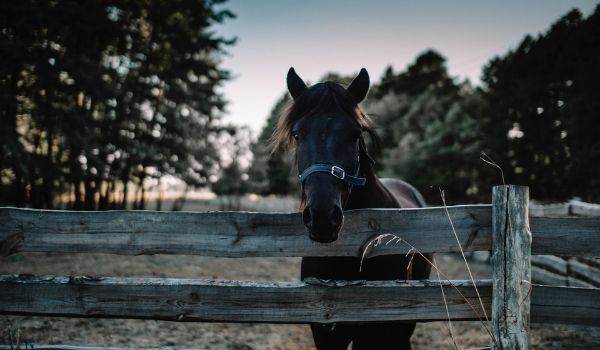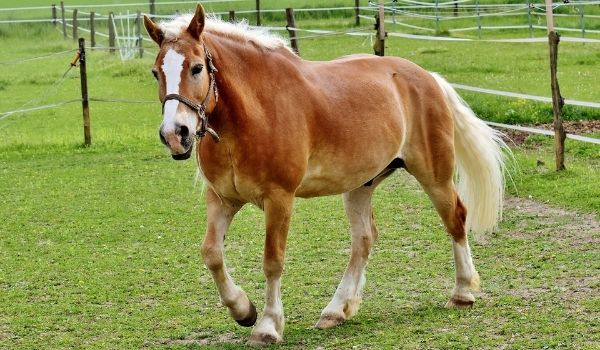Ever noticed your horse frequently walking around the perimeters of its stall or in frantic patterns? Occasionally walks are fine, but frequent walking around in the stall may become a problem for your horse’s health.
Just like humans, horses also get anxious or stressed due to several social or environmental factors that cause your horse to weave. The coping mechanism for frustration, isolation, or anxiety may differ from one horse to another. The quicker you understand the causes, the better you can take measures to prevent them. From factors to treatment, this blog contains everything you need to know about horse stall anxiety
Horse Stall Anxiety
Horses tend to walk or weave in their stalls due to several reasons, including frustration, stress, or anxiety. Stall weaving is an undesirable horse behavior in which a horse moves its neck and head from side to side while shifting its weight from one foot to another. It also includes picking up the front legs and swaying the rest of the body.
Types of Stall Walking
The two most common types of stall walking observed in horses are stereotypic and frantic.
- Stereotypic stall walking is classified as your horse walking slow, leaving a weary trail. It is a response to a tedious or poor environment that some are comfortable with while others are not.
- Frantic stall walking indicates that your horse is depressed or sorrowful. You may find your horse walking around the stall rapidly or neighing. Separation is the vital cause of frantic stall walking.
Symptoms of Horse Stall Anxiety
Different situations and events trigger anxiety or stress in every horse differently. A certain trigger may cause anxiety to one horse while may not do so in another. Prolonged stress or anxiety can cause serious health issues. The more time you spend with your horse, the better you can notice an unusual change in its behavior.
Here are a few symptoms of horse stall anxiety.
- Neighing
- Frantic pacing or slow pacing
- Dizzy state
- Defecating frequently
- Whining
- Abnormal hooves wearing
- Tooth grinding
- Weaving in front of stall bars or to the escape route
Do You Need to Worry?
Just as anxiety in humans can ruin our mental and physical state, it does the same to horses. The frequent stall walking may wear out the hooves and joints. The stall flooring may also get worn down. Similarly, horses may refuse to eat, perform, or play.
Factors Causing Stress in Horses
Understanding the mind and reading your horse’s body language may help you determine the main cause of its anxiety. Equine fellows have different health needs and impulsive behaviors, thus needing a distinct approach to get rid of stress or anxiety.
Some common factors that can cause stress in your horses are:
Boredom
Boredom can be a major factor in your horse’s anxiety. Horses are active animals and may get anxious when they find themselves confined to their stalls only, having nothing to do.
Separation Anxiety
Horses are herd animals and prefer socializing and living among herd mates. Even with no danger around, they have an instinct to protect themselves from predators and feel safe among other horses. When moved to a stall alone, it triggers anxiety in them and a longing for returning to their own folks.
Anxiety Before Large Events
You may have experienced your legs trembling or shaky voice before going up for big performances. It may sound unreal, but just like humans, horses can feel that too!
Horses can pick up on non-verbal cues such as the anxiety of the rider. The new environment or having no access to food or water during the event also makes them anxious. Or your horse may simply feel a sense of separation from the herd’s mates.
Changes in Diet or Exercise
Just as some humans may find it difficult to adjust to a different lifestyle, so does the horse. They become used to their daily comfort routine and thrive on consistency.
Horses are not fans of abrupt lifestyle changes, and it may cause anxiety, such as changing slow-paced training to high-intensity professional exercises or changing their diet patterns, or shifting a horse from a big stable to a less spacious room. If your horse has a certain diet schedule and doesn’t get food on time, it may trigger stress.
Old Trauma
Your horse may have endured trauma, and a certain situation may remind them of the experience they had in the past. If a horse has survived a trailer accident in the past, then stepping into the trailer may cause fear and distress in them.
It may not be possible for you to know your horse’s complete history or to diagnose the past trauma that your horse may have experienced, but you can try to avoid the situations that trigger anxiety in your equine.
Traveling Anxiety
Some horses cope with traveling quite well, while others find it the most stressful situation. The unfamiliar locations, change in routine, and feeling of being confined in a trailer can cause stress in them.
Reproduction
A pregnant mare may feel discomfort due to minute changes such as the development of a follicle on an ovary or frequent urination. During this stage, the activity levels also decrease, resulting in stress.
The contractions and birth itself are painful and trigger stress. You may notice your female horse pawing, pacing, sweating, laying down, getting up many times, or biting at her stomach due to restlessness. Usually, the stress issues resolve after foaling, but if not, then your veterinarian may suggest medicines for pain relief.
Poor Diet
If the diet does not meet the nutritional needs of your horse, then that may evoke stress in them. A proper horse diet includes:
- Carbohydrates
- Fats
- Protein
- Minerals
- Vitamins
Some horses prefer pellets over traditional hay. Horses need a balance between the fiber from forages such as long-stem hay or pasture grasses and legumes. A good source of forage should be at least 50% of the horse’s daily intake. If the diet is overloaded with grain, the possible consequences can be diarrhea or gastric issues that contribute to stress. Prefer feeding your horse small meals throughout the day. Additionally, they need 5 to 10 gallons of freshwater per day.
Buckeye Nutrition Gro ‘N Win Pelleted Horse Feed
Change in Weather
The rise and fall in thermometer may also cause stress in some horses. High temperature, poor ventilation, or exposure to direct sunlight can also result in stress.
Treatment
White Horse on Green Grass · Free Stock Photo (pexels.com)
The pet’s health is the owner’s utmost priority. If you notice any abnormal behavior, it is important to consult the veterinarian immediately to make sure that your horse does not have an underlying disease.
Other steps you can take include:
Get an Experienced Trainer
Your horse may be receiving non-verbal cues if you’re stressed while riding. A good trainer can read the stressed body language such as misplaced heels, tense shoulders, or tight hands. You can also work on your breath control and riding skills to make training fun and comfortable.
Minimize Change
Temporary changes do not cause anxiety in horses, but it is better to stick to a routine. If a major change is necessary and cannot be avoided, then try to make the changes gradually. This way, it will be convenient for your horse to adjust to the new environment. Consistency in routine may reduce stress levels.
Exercise More!
Horses are active animals and tend to bore easily when they do not find enough activities to release their pent-up energy. Better engage your horse in fun exercises to keep it physically and mentally healthy. Longer training sessions with the herd’s mate reduce stress and also help in building stamina.
Don’t Ride Alone
If your horse experiences separation anxiety, then it is better to have another horse buddy with you when you go horse riding. You can use a friend too. In this way, neither your horse will be alone nor you!
Use supplements
You can also use supplements to reduce stress levels and anxiety. The calming equine supplement helps in relieving stress and boost calmness in anxiety-prone horses.
Formula 707 Calming Horse Pellets
Final Words
The more time you spend with your horse, the better you can understand what causes anxiety in them and the quicker you can solve it. Be your horse’s reliable source, a sense of security, and someone it can rely on and trust. These loyal yet graceful creatures differ in personalities and have different natures; hence it is necessary to consult a veterinarian when you notice an abrupt change in behavior to avoid major health concerns.




